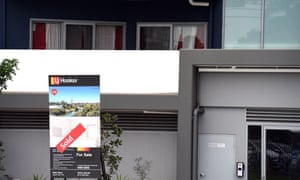Extract from The Guardian
Lower interest rates and a strong local economy push Sydney’s median
house price to $1,068,303, while Melbourne prices reach $773,669
• Stephen Koukoulas: house prices are surging because of low supply

• Stephen Koukoulas: house prices are surging because of low supply

Median house prices in Sydney and Melbourne have hit all-time highs and are likely to keep rising for the remainder of the year, new property figures show.
The September quarter property report published by Domain Group on Thursday found house prices hit a record level of $1,068,303 in Sydney, a 2.7% increase and the strongest quarterly growth rate since September 2015. Sydney unit prices reached $685,865 this quarter, an increase of 1.1%.
Domain chief economist Andrew Wilson said lower interest rates and a strong local economy had fuelled house price growth in Sydney, while unit prices also continued to rise despite new construction.
Melbourne house prices reached $773,669, a quarterly price growth rate of 3.1% and annual increase of 9.1%, the city’s 16th consecutive quarter of growth. Melbourne unit prices rose to $466,779, a growth rate of 4.5% over the quarter.
“A relative shortage of listings and increased interest from investors will continue to drive price growth in these capitals for the remainder of 2016,” Wilson said.
Darwin and Perth were the only capital cities to see year-on year declines, however Brisbane median prices fell 0.9% for the quarter, while median prices in Adelaide dropped by 0.3%.
The figures come as the former deputy chair of the parliamentary inquiry into home ownership, Labor MP Ed Husic, told the New Daily the government was deliberately avoiding progressing the inquiry.
This inquiry lapsed when the Standing Committee on Economics ceased to exist due to the triggering of a double dissolution in May.
“We had a lot of people spend a lot of time and thought putting together the submissions to help guide the committee, and it’s a slap in the face to those people that the inquiry has lapsed,” Husic said.
But Carolyn Whitzman, a professor in urban planning at the University of Melbourne, said she doubted that an inquiry was the best way forward.
“There’s a time for inquiries and there’s a time for action,” she said. “I’d say this is a time for action.”
She said Australia should follow Canada in putting money into a future fund that goes towards social housing, housing development, public transport and retrofitting houses to make them more sustainable.
“They’re seeing it as a jobs creation funding program, a global competitiveness program, that will also go towards developing new technologies as well,” Whitzman said.
“It would be great to see Australia doing the same.”
The former prime minister Kevin Rudd went some way towards this with his “national-building” plan announced in 2009 as a buffer against the global financial crisis, she said.
“It’s time the Australian government fronted up with an ambitious investment program to take Australia into the 21st century, and social and affordable housing needs to be a part of that,” she said.
“Housing affordability is getting worse, including rental affordability, so options are lowering for those who can’t afford to buy in the rental market as well.”
The September quarter property report published by Domain Group on Thursday found house prices hit a record level of $1,068,303 in Sydney, a 2.7% increase and the strongest quarterly growth rate since September 2015. Sydney unit prices reached $685,865 this quarter, an increase of 1.1%.
Domain chief economist Andrew Wilson said lower interest rates and a strong local economy had fuelled house price growth in Sydney, while unit prices also continued to rise despite new construction.
Melbourne house prices reached $773,669, a quarterly price growth rate of 3.1% and annual increase of 9.1%, the city’s 16th consecutive quarter of growth. Melbourne unit prices rose to $466,779, a growth rate of 4.5% over the quarter.
“A relative shortage of listings and increased interest from investors will continue to drive price growth in these capitals for the remainder of 2016,” Wilson said.
Darwin and Perth were the only capital cities to see year-on year declines, however Brisbane median prices fell 0.9% for the quarter, while median prices in Adelaide dropped by 0.3%.
The figures come as the former deputy chair of the parliamentary inquiry into home ownership, Labor MP Ed Husic, told the New Daily the government was deliberately avoiding progressing the inquiry.
This inquiry lapsed when the Standing Committee on Economics ceased to exist due to the triggering of a double dissolution in May.
“We had a lot of people spend a lot of time and thought putting together the submissions to help guide the committee, and it’s a slap in the face to those people that the inquiry has lapsed,” Husic said.
But Carolyn Whitzman, a professor in urban planning at the University of Melbourne, said she doubted that an inquiry was the best way forward.
“There’s a time for inquiries and there’s a time for action,” she said. “I’d say this is a time for action.”
She said Australia should follow Canada in putting money into a future fund that goes towards social housing, housing development, public transport and retrofitting houses to make them more sustainable.
“They’re seeing it as a jobs creation funding program, a global competitiveness program, that will also go towards developing new technologies as well,” Whitzman said.
“It would be great to see Australia doing the same.”
The former prime minister Kevin Rudd went some way towards this with his “national-building” plan announced in 2009 as a buffer against the global financial crisis, she said.
“It’s time the Australian government fronted up with an ambitious investment program to take Australia into the 21st century, and social and affordable housing needs to be a part of that,” she said.
“Housing affordability is getting worse, including rental affordability, so options are lowering for those who can’t afford to buy in the rental market as well.”
No comments:
Post a Comment